
A black-and-white cast adds provocative new shadings to 12 Angry Men as the Pasadena Playhouse revives the 20th Century jury room drama for a 21st Century audience, and though director Sheldon Epps’ re-envisioning of Reginald Rose’s now iconic play proves problematic, there’s no denying the power of the dynamic dozen actors onstage at the Playhouse or of Rose’s ingeniously constructeds, beautifully written classic.
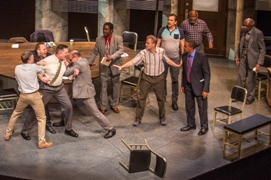 From its birth in 1954 as a live 60-minute episode of the CBS anthology series Studio One to its 1955 stage adaptation to a pair of film versions (theatrical in 1957 and made-for-TV in 1997) to its 2004 Broadway debut, 12 Angry Men’s tale of a single dissenting juror’s quest for truth and justice has kept audiences on the edge of their seats while at the same time reminding them of one of the prime tenets of our American justice system—a defendant is presumed innocent until proven guilty.
From its birth in 1954 as a live 60-minute episode of the CBS anthology series Studio One to its 1955 stage adaptation to a pair of film versions (theatrical in 1957 and made-for-TV in 1997) to its 2004 Broadway debut, 12 Angry Men’s tale of a single dissenting juror’s quest for truth and justice has kept audiences on the edge of their seats while at the same time reminding them of one of the prime tenets of our American justice system—a defendant is presumed innocent until proven guilty.
The setup is a simple one. A slum-dwelling teenager has been accused of stabbing his father to death. A pair of eye witnesses have identified him as the killer. Before even beginning their deliberation, eleven jurors have voted to convict the defendant for first degree murder (with a mandatory death sentence). Only one votes to acquit.
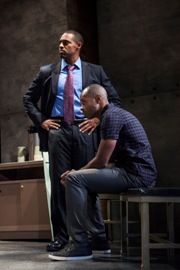 Then, little by little, this lone juror’s logical examination of testimony and evidence begins to plant seeds of reasonable doubt, first in one of his fellow jurors, and then another, and then another.
Then, little by little, this lone juror’s logical examination of testimony and evidence begins to plant seeds of reasonable doubt, first in one of his fellow jurors, and then another, and then another.
Since jurors’ names are never mentioned, we get to know them by the type of people they are.
The eldest (played at the Pasadena Playhouse by the venerable Adolphus Ward) is a kind old gentleman with the wisdom of ages. The juror played by Jacques C. Smith has grown up in the slums, but unlike the defendant, has not fallen victim to the mean streets of New York. Clinton Derricks-Carroll’s immigrant juror has come to appreciate this country’s system of justice perhaps even better than those born in the USA. Jeff Williams plays the jury’s most timid member, with a good heart but some difficulty committing to one side or another. Ellis E. Williams’ juror may be a tad slow, but he is honest and careful about the decisions he makes. And then there is Jason George as “Juror Number Eight,” whose desire for a fair, carefully reasoned verdict makes him the defendant’s knight in shining business suit.
Not all jurors are as open and fair-minded as the above. Scott Lowell’s foreman may seem a more honest sort than some of his fellow jurors, but that doesn’t stop him from wanting to convict. The same can be said for Robert Picardo’s stock-broker, among the most steadfast in refusing to be influenced by Juror Eight. Barry Pearl’s obnoxious salesman would rather be anywhere but on this jury. The slick, arrogant advertising executive portrayed by Adam J. Smith wants nothing more than to get back to his job and his life. Gregory North’s juror’s failed relationship with his own son has turned him into a boiling cauldron of bitterness and bile. As for the juror brought to life by Bradford Tatum, they don’t get uglier than this man whose heart and soul have been polluted by hatred and prejudice against anyone he perceives as being “one of them.”
The boy on trial is clearly “one of them,” and though Rose’s script does not specify his race, director Epps’ decision to cast a half-black, half-white jury suggests that the defendant may be African-American, thereby adding a fascinating new subtext to a script left largely unaltered for this production.
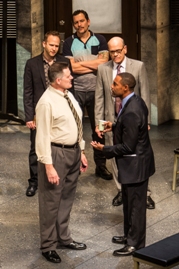 Epps’ concept is considerably less successful in the divvying up of jurors, since every single juror described in paragraph six of this review (the good guys) is African-American, and every single juror in paragraph seven (the bad guys) is Caucasian. While this makes a certain sense given the possible influence of race on their decision-making, and though it does at one pivotal moment in the production make for an exciting us-versus-them tableau, this reviewer could not help wishing for more balanced casting choices. Why not, for example, have had one of the black jurors be a Clarence Thomas type with little sympathy for the disadvantaged, and one of the whites be a bleeding-heart liberal more concerned with the reasons behind the defendant’s juvenile delinquent past than with seeing him punished for the crime he is alleged to have committed.
Epps’ concept is considerably less successful in the divvying up of jurors, since every single juror described in paragraph six of this review (the good guys) is African-American, and every single juror in paragraph seven (the bad guys) is Caucasian. While this makes a certain sense given the possible influence of race on their decision-making, and though it does at one pivotal moment in the production make for an exciting us-versus-them tableau, this reviewer could not help wishing for more balanced casting choices. Why not, for example, have had one of the black jurors be a Clarence Thomas type with little sympathy for the disadvantaged, and one of the whites be a bleeding-heart liberal more concerned with the reasons behind the defendant’s juvenile delinquent past than with seeing him punished for the crime he is alleged to have committed.
The 1997 TV movie also featured a mixed cast (eight Caucasians and four African-Americans), and went so far as to make the racist juror black. That’s not to say that the Pasadena Playhouse needed to follow the film’s example. Still, casting this despicable figure as white (though it adds to the dramatic tension of seeing a bigot surrounded by men he hates on sight in addition to providing a particularly gasp-worthy moment when the N-word finally escapes his lips) means that his vile rant about “those people” takes place with six of them right there in the room. (Would he really talk about “them” as if “they” weren’t there?) On the other hand, if “those people” aren’t exemplified by half of his fellow jurors, then who are they?
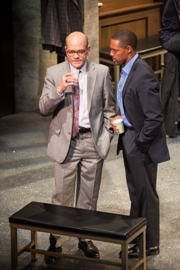 Still, if Epps’ experiment in casting isn’t as successful as I would have wished, the reasons to see 12 Angry Men at the Pasadena Playhouse far outweigh the negatives.
Still, if Epps’ experiment in casting isn’t as successful as I would have wished, the reasons to see 12 Angry Men at the Pasadena Playhouse far outweigh the negatives.
First and foremost is the opportunity to savor six sensational African-American actors in roles we might not otherwise get to see them play. The always extraordinary Ward is a figure of wisdom born from a lifetime of experience, Derricks-Carroll’s exquisitely played juror pays tribute to the American immigrant, and Smith and both Williamses are absolutely marvelous as well. As for leading man George, what a joy it is to see this superb actor play the heck out of a role made famous by the likes of Henry Fonda and Jack Lemmon.
The three most villainous characters happen also to make for some of the most thrilling performances you’ll see any time soon. North’s angry, embittered dad seems always on the edge of exploding into smithereens, Pearl’s nerve-grating salesman (whose conversion the actor makes absolutely believable) is another winner, and best of all is the extraordinary Tatum, who digs so deep and disappears so completely into his juror’s ugly racist skin that you can hardly believe it’s an actor up there on stage. Lowell, Picardo, and Smith too could scarcely be better in their roles.
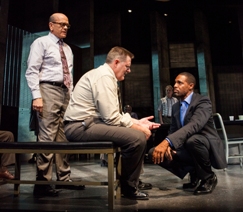 Scenic/costume designer Stephanie Kerley Schwartz gives us a great big prison-like jury deliberation room and outfits each character to perfection. (The program gives the time of the play as “Then … and Now,” and Kerley’s costumes manage to be both.) Brian L. Gale’s accomplished lighting and Jon Gottlieb’s striking sound design up the dramatic tension again and again.
Scenic/costume designer Stephanie Kerley Schwartz gives us a great big prison-like jury deliberation room and outfits each character to perfection. (The program gives the time of the play as “Then … and Now,” and Kerley’s costumes manage to be both.) Brian L. Gale’s accomplished lighting and Jon Gottlieb’s striking sound design up the dramatic tension again and again.
Casting of this proudly L.A.-based cast of actors is by Michael Donovan, CSA. Hethyr “Red” Verhoef is production stage manager and Jessica R. Aguilar is assistant stage manager. Joe Witt is general manager-production manager, Brad Enlow is technical director, and Kristen Hammack is company manager.
Ultimately, despite its imperfections, Epps’ contemporary vision of Rose’s classic drama is a powerful one, and one that will hopefully inspire a Pasadena Playhouse audience as diverse as the one onstage. Flaws and all, this is a production well worth seeing.
Pasadena Playhouse, 39 South El Molino Ave., Pasadena.
www.pasadenaplayhouse.org
–Steven Stanley
November 12, 2013
Photos: Jim Cox
Tags: Los Angeles Theater Review, Pasadena Playhouse, Reginald Rose, Sheldon Epps


 Since 2007, Steven Stanley's StageSceneLA.com has spotlighted the best in Southern California theater via reviews, interviews, and its annual StageSceneLA Scenies.
Since 2007, Steven Stanley's StageSceneLA.com has spotlighted the best in Southern California theater via reviews, interviews, and its annual StageSceneLA Scenies.







 COPYRIGHT 2025 STEVEN STANLEY :: DESIGN BY
COPYRIGHT 2025 STEVEN STANLEY :: DESIGN BY